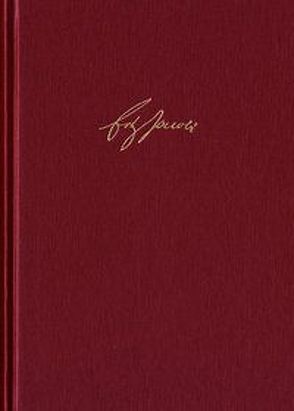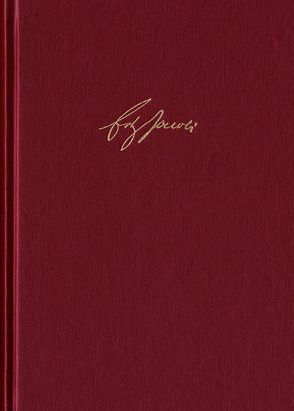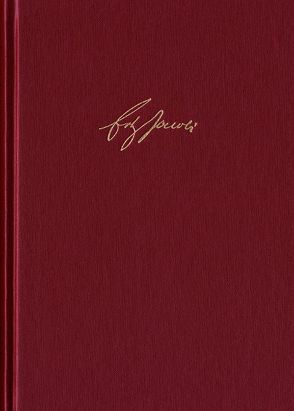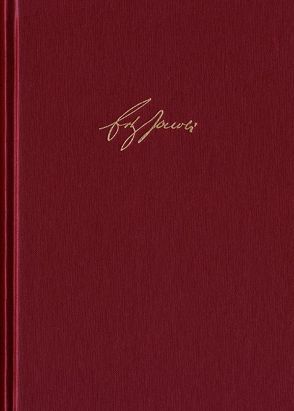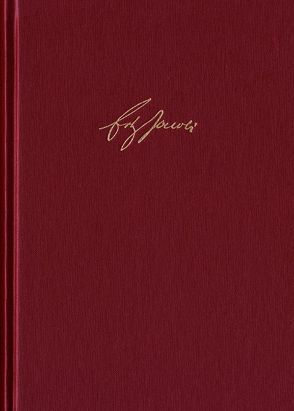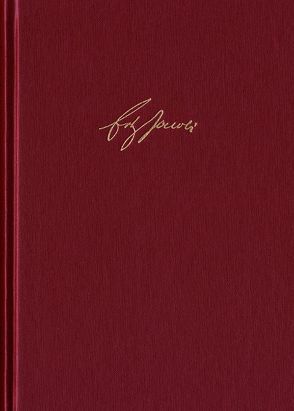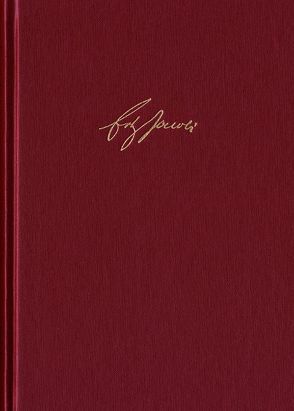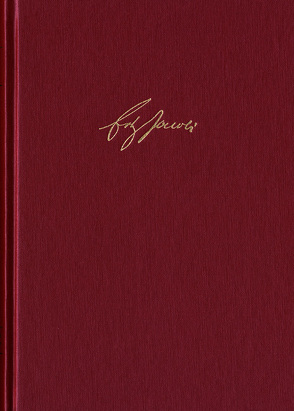
Ein großer Teil des ersten Bandes führt mit den Briefen Georges-Louis Le Sages und vor allem denjenigen an den Amsterdamer Buchhändler Marc Michel Rey, einem Landsmann und Vertrauten J. J. Rousseaus, tief in den französischen Sprachraum und in die geistig-politischen Auseinandersetzungen der Vorrevolutionszeit. Die Briefe Gleims und besonders die 1770/71 einsetzende Korrespondenz mit Wieland und Sophie von La Roche bringen das literarische Geschehen in Deutschland nahe. Die Freundschaft mit Goethe seit dem Sommer 1774 prägt die letzten Stücke des Bandes.
Containing the letters of Georges-Louis Le Sages and above all the ones written to the Amsterdam bookseller Marc Michel Rey, a countryman and confidant of J.J. Rousseau, a large part of the first volume leads the reader into the French-speaking world and into the intellectual and political disputes of the pre-revolutionary era. Gleim‘s letters and in particular the correspondence with Wieland, which started in 1770/71, and with Sophie von La Roche enable an understanding of literary events in Germany. The friendship with Goethe, which began in the summer of 1774, is the decisive element in the last parts of the volume.
Aktualisiert: 2023-03-14
> findR *
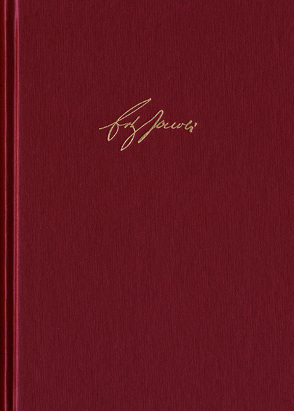
Nachdem die Neuauflage seines Spinozabuches und damit eine definitive Klärung des eigenen Standpunktes erst einmal in weitere Ferne gerückt ist, wechselt Jacobi die Strategie. Entgegen dem Rat Johann Georg Hamanns greift er in die polemisch geführten Auseinandersetzungen aufseiten der ›Krypto-Jesuiten‹ Johann Kaspar Lavater und Johann August Starck ein. Hier versucht er zu zeigen, dass der Aufklärungsanspruch von ›Berlinismus‹ und ›Illuminatismus‹ leer laufen muss, solange er von einer Vernunft ausgeht, die grundlos ›absolute Autorität‹ für sich reklamiert. Der Briefwechsel, der mit Hamanns ›Flucht‹ aus Jacobis Haus Anfang November 1787 einsetzt und mit dessen Tod im Juni 1788 endet, liefert eine Vielzahl von Hinweisen auf die Debattenlage.
After the new edition of his Spinoza book clarifying his own standpoint no longer had priority, Jacobi changed his strategy. Contrary to the advice of Johann Georg Hamanns, he intervened in the polemic disputes, taking the side of the crypto Jesuits, Johann Kaspar Lavater and Johann August Starck. It was here that he tried to show that the claim to enlightenment made by »Berlinism« and »Illuminatism« had to come to nothing as long as it was based on a reason which claimed absolute authority without having grounds for doing so. The correspondence which began with Hamann’s flight from Jacobi’s house at the beginning of November 1787 and ended with his death in June of 1788 provides a multitude of references to the status of the debate.
Aktualisiert: 2023-03-14
> findR *
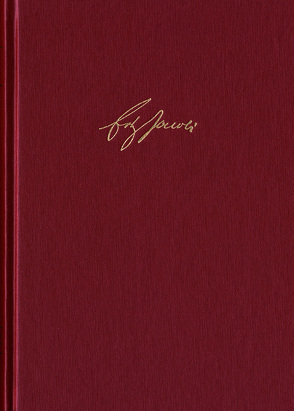
Die Briefe von Januar bis November des Jahres 1787 eröffnen Einblicke in eine Lebens- und Schaffensphase Jacobis, die nach dem Tod des ›Waffenträgers‹ Thomas Wizenmann von Veränderungen gekennzeichnet ist. Diese betreffen die häuslich-familiäre Sphäre ebenso wie das politisch-soziale Umfeld, vor allem jedoch Jacobis publizistische Arbeit. Trotz zunächst ungebrochener Produktivität - es erschienen sein ›David Hume‹ und die Übersetzung des ›Alexis‹ von Frans Hemsterhuis - machen sich auch bei Jacobi Zweifel breit. Die zumeist ablehnende Aufnahme seines Spinozabuches, die zweite Auflage der Kantischen Vernunftkritik und Herders Restitution des Spinoza drängen auf eine Klärung der eigenen Position, die Jacobi im Gespräch mit Freunden und Weggefährten, zuvorderst Johann Georg Hamann, zu gewinnen sucht.
The letters written between January and November of 1787 provide insight into a stage of Jacobi’s life and creativity which was characterized by changes after the death of the »Waffenträger« (armor bearer) Thomas Wizenmann . These concerned the situation at home and in the family as well as the political and social surroundings, primarily however Jacobi’s work as a journalist. In spite of his initially uninterrupted productivity, – his book on David Hume and the translation of ›Alexis‹ by Frans Hemsterhuis were published – he began to have doubts. The generally negative reception of his book on Spinoza, the second edition of Kant’s ›Critique of Pure Reason‹ and Herder‘s restitution of Spinoza put pressure on him to clarify his own position, which Jacobi tried to establish in discussions with friends and companions, first and foremost Johann Georg Hamann.
Aktualisiert: 2023-03-14
> findR *
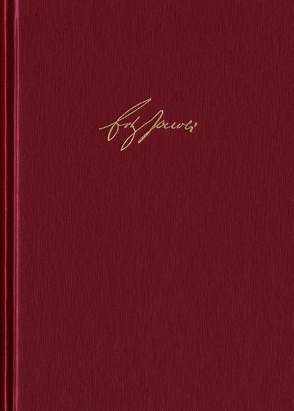
Vom Juli 1792 bis September 1794 ist Jacobis Briefwechsel insbesondere durch zwei sehr unterschiedliche Themen geprägt: Die ersten Monate sind noch weitgehend bestimmt durch die Fortsetzung der Briefe, die sein Sohn Georg Arnold von seiner Reise mit dem Grafen Stolberg nach Sizilien geschrieben hat. Daran schließen sich die in detaillierten Nachrichten über das für Jacobi und seine Familie bedrohliche Vordringen der französischen Revolutionstruppen in Süddeutschland und vor allem im Raum Aachen und Düsseldorf an, das ihn Ende September 1794 zur Flucht aus Pempelfort nach Norddeutschland veranlasst.
Between July 1792 and September 1794, Jacobi’s correspondence was characterized by two very different subjects in particular. The first months were widely defined by the continuation of the letters which his son Georg Arnold wrote from Sicily during his trip with Count Stolberg. These were followed by detailed reports on the advance of the troops of the French Revolution into Southern Germany and above all into the Aachen and Düsseldorf regions. These reports, constituting a threat to Jacobi and his family, caused him to flee from Pempelfort to Northern Germany at the end of September 1794.
Aktualisiert: 2023-03-14
> findR *
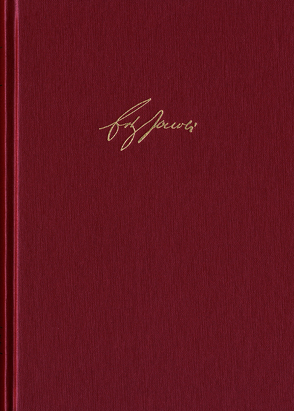
Jacobis letzte Jahre in Pempelfort sind geprägt von der gedanklichen Auseinandersetzung mit der Französischen Revolution, aber auch von der erneuerten Verbindung mit Goethe sowie der Überarbeitung der Romane ›Allwill‹ (1792) und ›Woldemar‹ (1794). Einen wichtigen Bestandteil der Korrespondenz bilden die ausführlichen Berichte seines Sohnes Georg Arnold von der Italienreise mit F. L. Graf zu Stolberg. Doch Jacobis eigene Reisepläne werden bereits überschattet vom Krieg mit Frankreich. Über die zunehmende Bedrohung wird Jacobi auch durch zahlreiche Nachrichten seines in Aachen lebenden Sohnes unterrichtet; sie werden ihn veranlassen, beim Vormarsch der Franzosen im September 1794 seinen erst kurz zuvor neu gestalteten Wohnsitz zu verlassen.
Characteristic of Jacobi’s final years in Pempelfort was his study of the French Revolution, but also the renewal of his contact to Goethe as well as the revision of his two novels, ›Allwill‹ (1792) und ›Woldemar‹ (1794). The detailed reports sent by his son Georg Arnold from his trip to Italy with Count F.L. zu Stolberg are an important part of the correspondence. Jacobi‘s own travel plans, however, were already overshadowed by the war with France. Informed of the increasing threat in numerous messages from his son, who lived in Aachen, he decided to leave the home he had just renovated when the French advanced in September of 1794.
Aktualisiert: 2023-03-14
> findR *
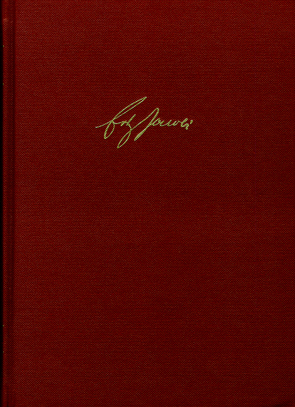
Die thematischen Schwerpunkte dieses Kommentarbands sind durch den Textband (I,9) vorgegeben: Sie liegen in Jacobis Auseinandersetzung mit der Französischen Revolution, in der Vorbereitung eines Bandes ›Vermischte Schriften‹, aus der ungeplant die Neubearbeitung des ›Allwill‹ hervorgeht, in der Abfassung der ›Epistel über die Kantische Philosophie‹ für Matthias Claudius und vor allem in der Reise seines Sohnes Georg Arnold mit F. L. Graf zu Stolberg nach Italien und Sizilien. Für die Werke Jacobis zeichnet der Kommentar die Entstehungsgeschichte detailliert nach, für die Reisebriefe die Reiseroute.
The thematic focus of this commentary volume is determined by the letters published in volume I,9: The emphasis is on Jacobis critical analysis of the French Revolution, on the preparation of a new volume of his »Miscellaneous Writings«, with the unexpected result of the publication of a new version of his »Allwill«, on his work »Letters on Kant's Philosophy«, written for Matthias Claudius, and especially on his son's letters from his journey to Italy and Sicily, together with F. L. zu Stolberg. The commentary provides detailed information on the genesis of Jacobi's writings and on his sons's itinerary.
Aktualisiert: 2023-03-14
> findR *
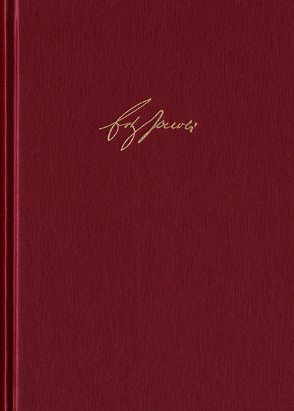
Die Briefe des zweiten Bandes zeigen Jacobi auf dem Höhepunkt seiner beruflich-politischen Tätigkeit. Als Ministerialreferent für Zoll- und Handelswesen erreicht er, daß Leibeigenschaft und Frondienste in Pfalz-Bayern abgeschafft werden. Zu dieser Zeit entstehen auch die beiden Romane ›Eduard Allwills Papiere‹ und ›Woldemar‹. Die Beziehungen zu Wieland und Goethe brechen nach harten Auseinandersetzungen ab. Als Korrespondenzpartner werden wichtig: J. J. K. Lavater, J. J. W. Heinse und J. G. Forster. Die zweite Hälfte des Bandes beherrscht, neben der folgenreichen Freundschaft mit Lessing, die Verbindung zum Kreis von Münster.
The letters in the second volume show Jacobi at the height of his professional and political career. As a minister and privy councillor for the department of customs and trade, he saw to it that serfdom and compulsory labor were abolished in Palatinate-Bavaria. It was during this time that he wrote the two novels ›Eduard Allwills Papiere‹ (Eduard Allwill’s Papers) and ›Woldemar‹. His relationships with Wieland and Goethe were broken off after severe disputes. Among those with whom he corresponded, those who were important included J. K. Lavater, J. J. W. Heinse and J. G. Forster. In addition to his fateful friendship with Lessing, the second half of the volume is dominated by his connection to the Kreis von Münster (Münster Circle).
Aktualisiert: 2023-03-14
> findR *
The thematic focus of this commentary volume is determined by the letters published in volume I,9: The emphasis is on Jacobis critical analysis of the French Revolution, on the preparation of a new volume of his »Miscellaneous Writings«, with the unexpected result of the publication of a new version of his »Allwill«, on his work »Letters on Kant's Philosophy«, written for Matthias Claudius, and especially on his son's letters from his journey to Italy and Sicily, together with F. L. zu Stolberg. The commentary provides detailed information on the genesis of Jacobi's writings and on his sons's itinerary.
Aktualisiert: 2023-03-14
> findR *
The letters in the second volume show Jacobi at the height of his professional and political career. As a minister and privy councillor for the department of customs and trade, he saw to it that serfdom and compulsory labor were abolished in Palatinate-Bavaria. It was during this time that he wrote the two novels ›Eduard Allwills Papiere‹ (Eduard Allwill’s Papers) and ›Woldemar‹. His relationships with Wieland and Goethe were broken off after severe disputes. Among those with whom he corresponded, those who were important included J. K. Lavater, J. J. W. Heinse and J. G. Forster. In addition to his fateful friendship with Lessing, the second half of the volume is dominated by his connection to the Kreis von Münster (Münster Circle).
Aktualisiert: 2023-03-14
> findR *
After the new edition of his Spinoza book clarifying his own standpoint no longer had priority, Jacobi changed his strategy. Contrary to the advice of Johann Georg Hamanns, he intervened in the polemic disputes, taking the side of the crypto Jesuits, Johann Kaspar Lavater and Johann August Starck. It was here that he tried to show that the claim to enlightenment made by »Berlinism« and »Illuminatism« had to come to nothing as long as it was based on a reason which claimed absolute authority without having grounds for doing so. The correspondence which began with Hamann’s flight from Jacobi’s house at the beginning of November 1787 and ended with his death in June of 1788 provides a multitude of references to the status of the debate.
Aktualisiert: 2023-03-14
> findR *
Characteristic of Jacobi’s final years in Pempelfort was his study of the French Revolution, but also the renewal of his contact to Goethe as well as the revision of his two novels, ›Allwill‹ (1792) und ›Woldemar‹ (1794). The detailed reports sent by his son Georg Arnold from his trip to Italy with Count F.L. zu Stolberg are an important part of the correspondence. Jacobi‘s own travel plans, however, were already overshadowed by the war with France. Informed of the increasing threat in numerous messages from his son, who lived in Aachen, he decided to leave the home he had just renovated when the French advanced in September of 1794.
Aktualisiert: 2023-03-14
> findR *
Between July 1792 and September 1794, Jacobi’s correspondence was characterized by two very different subjects in particular. The first months were widely defined by the continuation of the letters which his son Georg Arnold wrote from Sicily during his trip with Count Stolberg. These were followed by detailed reports on the advance of the troops of the French Revolution into Southern Germany and above all into the Aachen and Düsseldorf regions. These reports, constituting a threat to Jacobi and his family, caused him to flee from Pempelfort to Northern Germany at the end of September 1794.
Aktualisiert: 2023-03-14
> findR *
The letters written between January and November of 1787 provide insight into a stage of Jacobi’s life and creativity which was characterized by changes after the death of the »Waffenträger« (armor bearer) Thomas Wizenmann . These concerned the situation at home and in the family as well as the political and social surroundings, primarily however Jacobi’s work as a journalist. In spite of his initially uninterrupted productivity, – his book on David Hume and the translation of ›Alexis‹ by Frans Hemsterhuis were published – he began to have doubts. The generally negative reception of his book on Spinoza, the second edition of Kant’s ›Critique of Pure Reason‹ and Herder‘s restitution of Spinoza put pressure on him to clarify his own position, which Jacobi tried to establish in discussions with friends and companions, first and foremost Johann Georg Hamann.
Aktualisiert: 2023-03-14
> findR *
Containing the letters of Georges-Louis Le Sages and above all the ones written to the Amsterdam bookseller Marc Michel Rey, a countryman and confidant of J.J. Rousseau, a large part of the first volume leads the reader into the French-speaking world and into the intellectual and political disputes of the pre-revolutionary era. Gleim‘s letters and in particular the correspondence with Wieland, which started in 1770/71, and with Sophie von La Roche enable an understanding of literary events in Germany. The friendship with Goethe, which began in the summer of 1774, is the decisive element in the last parts of the volume.
Aktualisiert: 2023-03-14
> findR *
MEHR ANZEIGEN
Bücher von Sudhof, Siegfried
Sie suchen ein Buch oder Publikation vonSudhof, Siegfried ? Bei Buch findr finden Sie alle Bücher Sudhof, Siegfried.
Entdecken Sie neue Bücher oder Klassiker für Sie selbst oder zum Verschenken. Buch findr hat zahlreiche Bücher
von Sudhof, Siegfried im Sortiment. Nehmen Sie sich Zeit zum Stöbern und finden Sie das passende Buch oder die
Publiketion für Ihr Lesevergnügen oder Ihr Interessensgebiet. Stöbern Sie durch unser Angebot und finden Sie aus
unserer großen Auswahl das Buch, das Ihnen zusagt. Bei Buch findr finden Sie Romane, Ratgeber, wissenschaftliche und
populärwissenschaftliche Bücher uvm. Bestellen Sie Ihr Buch zu Ihrem Thema einfach online und lassen Sie es sich
bequem nach Hause schicken. Wir wünschen Ihnen schöne und entspannte Lesemomente mit Ihrem Buch
von Sudhof, Siegfried .
Sudhof, Siegfried - Große Auswahl an Publikationen bei Buch findr
Bei uns finden Sie Bücher aller beliebter Autoren, Neuerscheinungen, Bestseller genauso wie alte Schätze. Bücher
von Sudhof, Siegfried die Ihre Fantasie anregen und Bücher, die Sie weiterbilden und Ihnen wissenschaftliche Fakten
vermitteln. Ganz nach Ihrem Geschmack ist das passende Buch für Sie dabei. Finden Sie eine große Auswahl Bücher
verschiedenster Genres, Verlage, Schlagworte Genre bei Buchfindr:
Unser Repertoire umfasst Bücher von
Sie haben viele Möglichkeiten bei Buch findr die passenden Bücher für Ihr Lesevergnügen zu entdecken. Nutzen Sie
unsere Suchfunktionen, um zu stöbern und für Sie interessante Bücher in den unterschiedlichen Genres und Kategorien
zu finden. Neben Büchern von Sudhof, Siegfried und Büchern aus verschiedenen Kategorien finden Sie schnell und
einfach auch eine Auflistung thematisch passender Publikationen. Probieren Sie es aus, legen Sie jetzt los! Ihrem
Lesevergnügen steht nichts im Wege. Nutzen Sie die Vorteile Ihre Bücher online zu kaufen und bekommen Sie die
bestellten Bücher schnell und bequem zugestellt. Nehmen Sie sich die Zeit, online die Bücher Ihrer Wahl anzulesen,
Buchempfehlungen und Rezensionen zu studieren, Informationen zu Autoren zu lesen. Viel Spaß beim Lesen wünscht Ihnen
das Team von Buchfindr.







